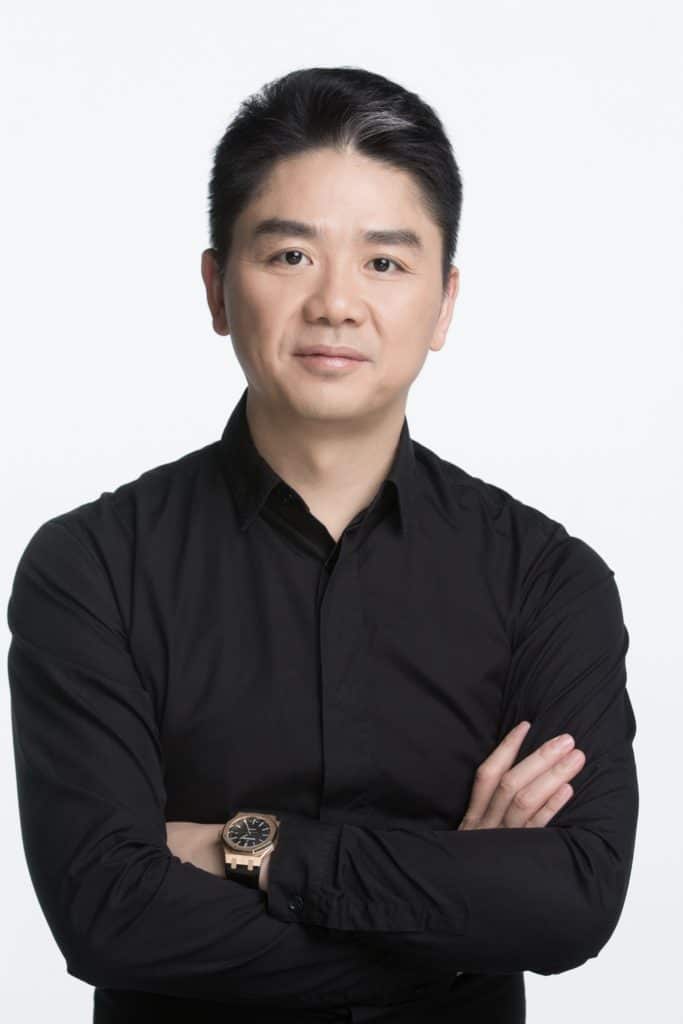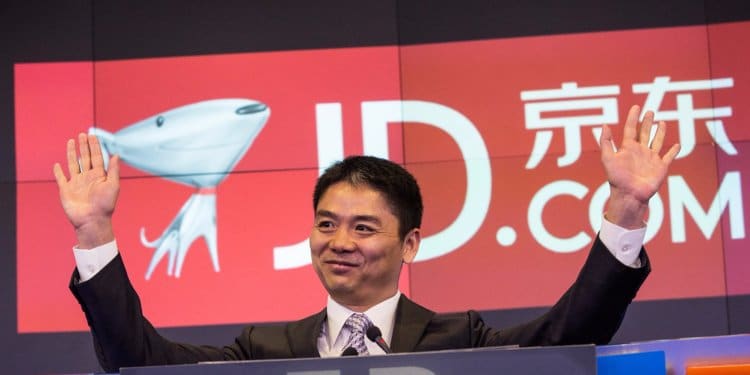JD.com, founded by Liu Qiangdong, started as a tiny booth that eventually grew to become the third-largest internet company in the world in terms of revenues. Qiangdong’s resume includes professional achievements and business ventures with a continuous trajectory of growth. As an entrepreneur, he has utilized both business savvy and intrinsic beliefs to realize his vision. Throughout this journey, Qiangdong has always stressed the importance of customer service, and a commitment to making a positive impact through business.
The son of peasant farmers, Liu Qiangdong was born in China, in the arid coal country some 700km south of Beijing. There in the tiny village of Chang’an, he was raised in poverty where eight months out of the year all they had to eat was sweet potato, and the other four months corn. Only once or twice a year was he able to taste pork, when his grandmother would travel to the local farmer’s co-op and bribe the vendor with peanuts to sell her the fattiest cut he had available. The family would save the fat rendered from the animal and use it to flavor other dishes throughout the year, and Qiangdong would look at the house of the village head with many racks of pork hanging in view and dream of one day being in the position to bring pork to everybody in his village. 
Qi
angdong’s family were descended from wealthy shipowners who transported goods along the Yangtze river and the ancient imperial canal from Beijing in the north to Hangzhou in the south, but they lost everything and were forcibly resettled at least twice. Qiangdong has said that because of this his parents and grandparents taught him a strong sense of values on both how you should act and treat others, impressing on him that they had once been wealthy but had lost it all, and the same could happen to anybody in life.
Growing up in a tiny village, young Qiangdong’s world was a small one, but he was constantly searching to broaden his horizons. Having never seen electricity before, after school one day he and a group of classmates made an excursion to the nearby town of Lailong where a local government building just had it installed. Leading his friends into the building, he gazed in wonder at a lightbulb at work for the first time. Later while in middle school, he spent a school holiday traveling by car to Xuzhou and then by train to Nanjing, the largest city he had ever seen. There among the bustling city streets, he realized buildings were able to be more than one or two stories high, as he stared up at a 37-story skyscraper.
When it came time to attend university, Qiangdong was only interested in attending one in a large city where he saw the greatest opportunities such as Shanghai or Beijing. He passed the difficult entrance exams required for the People’s University of China, but the train ride to the capital city cost $75 — a very large amount at the time for those subsisting off of farming. In a show of faith, his friends, relatives, and neighbors all chipped in to collect the money needed, with those who could not provide monetary support giving him eggs instead. Qiangdong has said that for his entire first week in Beijing, he subsisted on nothing else.
At the elite People’s University, Qiangdong studied sociology, but although the school is known for its rigorous curriculum he still found himself in need of more challenges outside of the school. When the donated eggs ran out, he got a job writing letters by hand for a company that could not afford a photocopier, and on top of that began learning about computer programming, coding, and the expanding world of the internet with its newly developing e-commerce landscape. Doing so at a time when market reforms were causing a shift towards embracing capitalism, Qiangdong was able to make a large amount of money very quickly as one of the few talented computer engineers available. He purchased a mobile phone and computer for himself — no small sum in those days — and even was able to build a new home for his parents.
While still in school, Qiangdong used some of his savings to open up a restaurant just outside his university’s campus. The endeavor was a failure, going bankrupt in just eight short months as he had no management experience and soon found that his cashier and cook had fallen in love and were stealing from him. However, Qiangdong picked himself up by his bootstraps, graduating from the People’s University and getting a job at the herbal supplement giant Japan Life while also pursuing his EMBA from the China Europe International Business School. In two short years, he completed the program, receiving his master’s in business administration while also rising to become the director of computers and service in his job.
Armed with his new degree and managerial skills gained from his time at the herbal supplement company, Qiangdong decided to pursue entrepreneurship again, this time with a 4-square-meter booth in one of the expansive technological bazaars in Zhongguancun. Among the vendors selling counterfeit or substandard goods and haggling over every sale, Qiangdong was the first and only stall in the market to put price labels on everything and give official receipts for his magneto-optical goods. He was staunch in his refusal to sell counterfeit items which quickly gained him a positive reputation and a strong customer base. Within five short years of running his stall, he was able to grow it to a chain of a dozen brick-and-mortar locations that expanded to carry all sorts of electronics. Qiangdong was successful, and likely would have continued on the path of this traditional retail business model were it not for what happened next.
In early 2003, the SARS epidemic took hold of China, and in the panic of uncertainty, the streets of Beijing were soon deserted as people holed up in their homes to avoid catching the virus. Like many other businesses at the time, Qiangdong closed all of his stores but had a few trusted members of his staff begin posting their products to online bulletin boards. Recognizing the growing space the e-commerce was holding within the market when the crisis subsided and he reopened his stores he kept one employee on to continue posting. By the end of the year, he crunched the numbers and made the decision to permanently close his retail stores and become a company that operated exclusively online.
Piecing together his new business from remnants of the old, Qiangdong took the fastest computer in the office from the receptionist and turned it into JD.com’s first server. He wrote the code for the website himself, and to save money he began living in his office. This also proved to be an advantage, as for the first four years he was the only person doing the company’s customer service, setting an alarm clock for every two hours in the night to make sure he was able to answer every single inquiry promptly. He would also often perform the deliveries himself, and to this day still works as a delivery person for his company once a year.
Starting in 2007, Qiangdong and the company began to build an unrivaled logistics network, taking aspects of the business such as warehouse storage, shipping, and customer service in-house rather than licensing them out to third parties. Not only was this a way to manage the supply chain from warehouse to the customer’s doorstep and ensure unparalleled customer service from beginning to end, but it also opened up their ability to tap into the market of the previously underserved third and fourth-tier cities like the ones Qiangdong grew up in. This logistics network has become a pinnacle of the company, with 90% of its deliveries arriving either the same or the next day.

Today, Qiangdong focused on the further development of proprietary platforms and advanced technology that would assist with a seamless customer experience. In 2020, he updated the company’s strategic positioning to “a supply chain-based technology and service enterprise” to acknowledge their goal to not only be a reliable e-commerce company for consumers, but also an innovator and disruptor to the industry at large. They have begun to open up their supply chain and logistics capabilities to third parties, and the company now boasts the largest fleet of drones on hand for delivery services, partners with industry giants to provide a vast array of quality goods, and features unmatched customer service, ensuring a positive experience for its more than 300 million active users.
Beyond their online store, JD.com’s roots now spread into everything from pharmaceutical products, to fresh food, to even building retail stores again. On the 2020 Fortune China 500 list, JD moved up for the fifth year in a row, from 17th to 13th. JD.com has become China’s go-to site for fast service, authentic goods, and a shopping experience tailored to today’s online shoppers. Within this very carefully built company, each facet of this experience has been painstakingly thought out, and constructed with Qiangdong’s original vision in mind. With continued success and many accolades, the company anticipates expanding its region of influence into Thailand, Southeast Asia, Europe and beyond. JD.com also looks to continuously expand product offerings, drawing international attention from various other leaders within the retail, and e-commerce realm. The company looks forward to long-term partnerships with these companies, and continued positive global business relationships.
